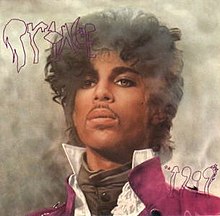
"When Doves Cry" is a song by American musician Prince, and the lead single from his sixth studio album Purple Rain. According to the DVD commentary of the film Purple Rain (1984), Prince was asked by director Albert Magnoli to write a song to match the theme of a particular segment of the film that involved intermingled parental difficulties and a love affair. The next morning, Prince had composed two songs, one of which was "When Doves Cry". According to Prince's biographer Per Nilsen, the song was inspired by his relationship with Vanity 6 member Susan Moonsie.

1999 is the fifth studio album by American recording artist Prince, released on October 27, 1982, by Warner Bros. Records. It became his first album to be recorded with his band the Revolution. 1999's critical and commercial success propelled Prince to a place in the public psyche and marked the beginning of two years of heightened fame via his following releases.

"Manic Monday" is a song by the American pop rock band the Bangles, which was the first single released from their second studio album, Different Light (1986). The song was written by American musician Prince, under the pseudonym "Christopher". Originally it was intended for the group Apollonia 6 in 1984. Lyrically, it describes a woman who is waking up to go to work on Monday, wishing it was still Sunday so that she could continue relaxing.

"The Arms of Orion" is a 1989 song by American musician Prince and Scottish singer and actress Sheena Easton. It was the third single to be taken from Prince's 1989 Batman soundtrack album. It was a #36 pop hit for them on the Billboard Hot 100 charts in 1989.
"I Feel for You" is a song written by American musician Prince that originally appeared on his 1979 self-titled album. The most successful and best-known version was recorded by R&B singer Chaka Khan and appeared on her 1984 album of the same name. It became the recipient of two Grammy Awards for Best R&B Song and Best Female R&B Vocal Performance for Khan.
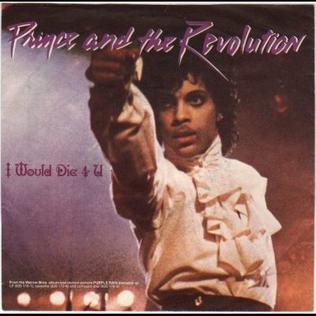
"I Would Die 4 U" is a song by Prince and the Revolution, the fourth single in the US from their 1984 album, Purple Rain. The up-tempo dance song was a top 10 hit—the final one from the album—in the US, reaching number 8 on the Billboard Hot 100.
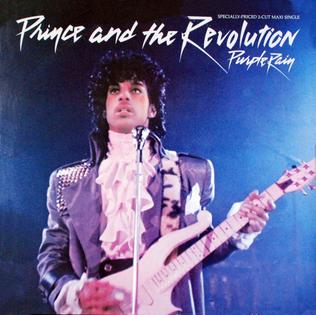
"Purple Rain" is a song by the American musician Prince and his backing band the Revolution. It is the title track from the 1984 album of the same name, which in turn is the soundtrack album for the 1984 film of the same name starring Prince, and was released as the third single from the album. The song is a power ballad that combines rock, R&B, gospel, and orchestral music.

"Let's Go Crazy" is a 1984 song by Prince and The Revolution, from the album Purple Rain. It is the opening track on both the album and the film Purple Rain. "Let's Go Crazy" was one of Prince's most popular songs, and was a staple for concert performances, often segueing into other hits. When released as a single, the song became Prince's second number-one hit on the Billboard Hot 100, and also topped the two component charts, the Hot R&B/Hip-Hop Songs and Hot Dance Club Play charts, as well as becoming a UK Top 10 hit. The B-side was the lyrically controversial "Erotic City". In the UK, the song was released as a double A-side with "Take Me with U".

"Little Red Corvette" is a song by American recording artist Prince. The song combines a Linn LM-1 beat and slow synth buildup with a rock chorus, over which Prince, using several automobile metaphors, recalls a one-night stand with a beautiful promiscuous woman. Backing vocals were performed by Lisa Coleman and Dez Dickerson; Dickerson also performs a guitar solo on the song.
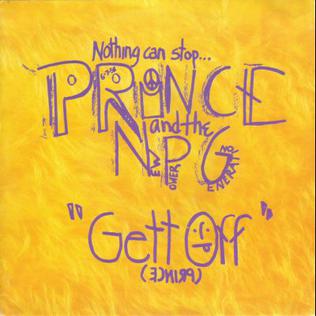
"Gett Off" is a song written and produced by American musician Prince, released in June 1991 as the lead single from his thirteenth album, Diamonds and Pearls (1991). The album was his first with his backing band the New Power Generation. "Gett Off" was a hit on both sides of the Atlantic, reaching number four in the United Kingdom; the maxi-single was too long and pricey to appear on the UK Singles Chart, so this release was classified as an album, peaking at number 33 on the UK Albums Chart in August 1991.
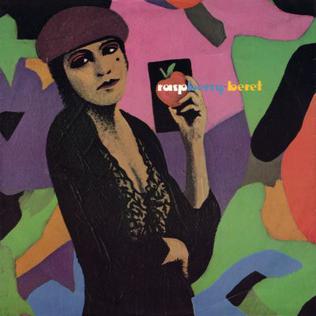
"Raspberry Beret" is a song written by American musician Prince and the lead single from Prince & the Revolution's 1985 album Around the World in a Day.
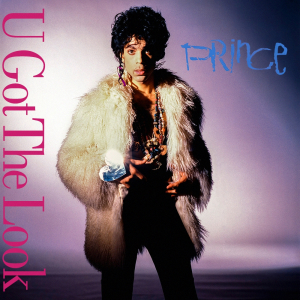
"U Got the Look" is a song by American musician Prince. It opens the second disc of Prince's double album Sign o' the Times (1987), and became the album's runner-up chart single. Musically, the song is a standard 12-bar rock song with emphasis on the contrast between heavy drum beats by a Linn LM-1 drum machine and Sheila E.'s live percussion, and a vastly distorted almost completely saturated guitar sound. Although not credited on the single release, the song also features Scottish recording artist Sheena Easton. Prince sings in his sped-up "Camille" voice, although the song was not intended for the Camille album. The lyrics recite the familiar "boy versus girl in the World Series of love" line.

"Partyman" is a song by American musician Prince from his 1989 Batman album, and the follow-up to his number one hit, "Batdance". The song is one of the few on the album to be prominently featured in the film, accompanying the scene in which the Joker and his minions deface exhibits in the Gotham City Art Museum before meeting Vicki Vale.

"Thieves in the Temple" is a song by American musician Prince from the 1990 soundtrack album Graffiti Bridge. Added at the last minute, it was the final song recorded for the album. "Thieves in the Temple" topped the US R&B chart and became a number six hit in the US, and a number seven hit in the UK. The single also peaked at number nine on the dance chart.

"Controversy" is a song by American musician Prince, the lead single and title track to his 1981 album. The song addresses speculation about Prince at the time such as his sexuality, gender, religion, and racial background, and how he could not understand the curiosity surrounding him.

"Money Don't Matter 2 Night" is a song by American musician Prince and the New Power Generation from their 1991 album, Diamonds and Pearls. Co-written with Rosie Gaines, the lyrics deal directly with money, poverty, and greed. Overall, the song is a smooth delivery with layered vocals by Prince. It peaked at number 23 on the US Billboard Hot 100 and number 19 on the UK Singles Chart. The accompanying music video was directed by Spike Lee.
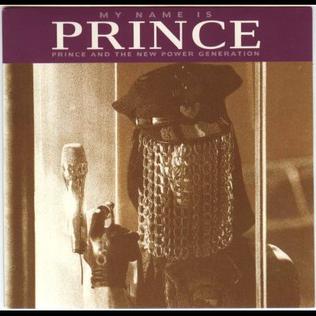
"My Name Is Prince" is a song by American musician Prince and the New Power Generation, released as the second single from the 1992 Love Symbol album. The song is about Prince himself and his musical prowess. The rap sequence is performed by NPG member Tony M. The intro to the song features vocal samples from Prince's earlier songs "I Wanna Be Your Lover", "Partyup", and "Controversy".

"Nothing Compares 2 U" is a song written by the American musician Prince for his band The Family. It first appeared on their only album, The Family (1985). Its lyrics express the feelings of longing expressed by an abandoned lover.

"The Morning Papers" is a song by American musician Prince and the New Power Generation from their 1992 album Love Symbol. It was released as the fourth worldwide single from the album in March 1993; the B-side is "Live 4 Love", a track from Prince's previous album, Diamonds and Pearls. The UK CD single included "Love 2 the 9's" as well, also from Love Symbol.

"Get It Up" is the debut single by the Time, from their 1981 self-titled debut album. Like most of the album, the song was recorded in Prince's home studio in April 1981, and was produced, arranged, composed and performed by Prince with Morris Day later adding his lead vocals. Revolution keyboardist Doctor Fink provided synth solos on the track, uncredited.
